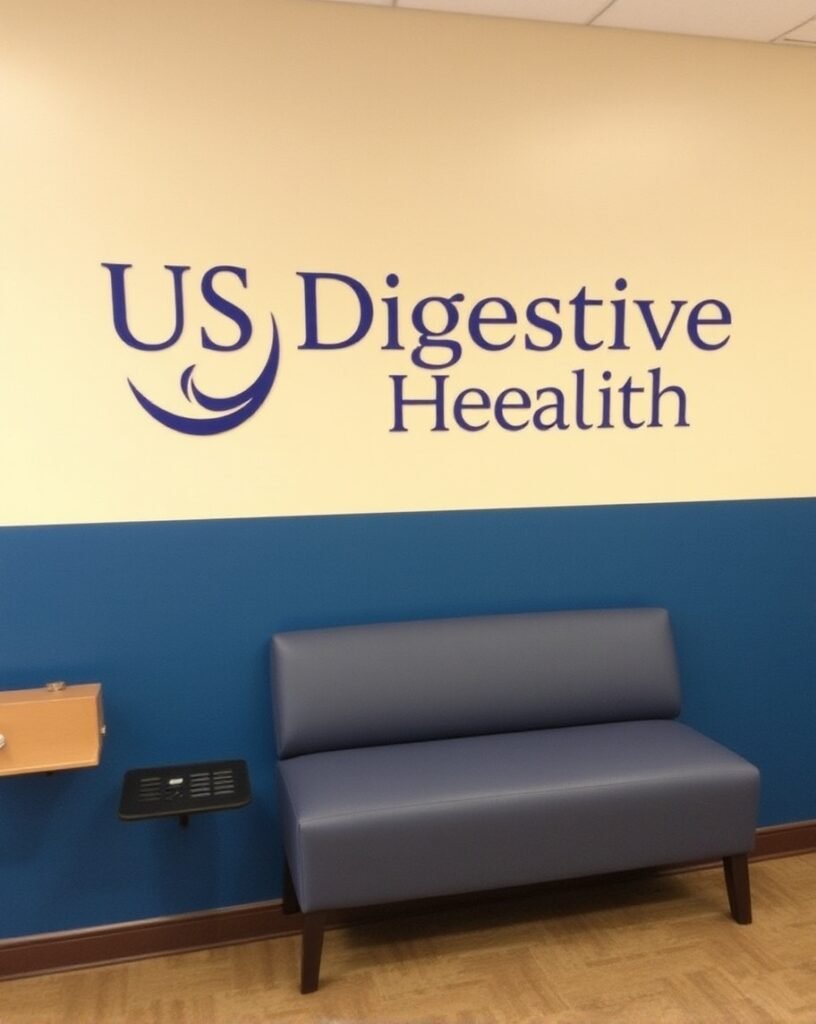Table of Contents
US Digestive Health at Wyomissing: Discover 7 Key Steps to Boost Wellness and Vitality

Introduction
Digestive health is an integral part of overall wellness that is often overlooked. A well-functioning digestive system ensures proper nutrient absorption, supports immunity, and plays a role in mental well-being due to the gut-brain connection. With facilities like US Digestive Health at Wyomissing, individuals in Wyomissing have access to specialized care that can significantly improve their digestive health. This blog explores seven steps anyone can take to enhance their digestive health and overall vitality.
The goal of these steps is not only to address existing digestive issues but also to prevent future problems by incorporating healthy habits into daily routines. With services and guidance available at US Digestive Health at Wyomissing, individuals can feel empowered to take control of their health.
1: Prioritize Regular Digestive Screenings
Regular screenings are crucial for identifying potential issues in their early stages. US Digestive Health at Wyomissing offers a variety of screening tests, each with a specific purpose and designed to diagnose or prevent digestive conditions:
Colonoscopies are particularly important for detecting colorectal cancer early on. This procedure allows doctors to identify and remove polyps that could potentially develop into cancer over time.
Endoscopies are used to view the digestive tract and can help diagnose conditions such as GERD, celiac disease, or Crohn’s disease. This is particularly useful for those who experience unexplained digestive discomfort.
Stool Tests offer non-invasive options for detecting infections, inflammation, and the presence of blood in the stool, which can be indicators of serious conditions like ulcers or colon cancer.
Screenings such as these are essential tools in preventative healthcare. Regular check-ups allow for early diagnosis and treatment, which improves long-term outcomes and can often prevent more invasive procedures down the line.
2: Embrace a Balanced and Nutritious Diet
A nutritious diet is the foundation of good digestive health. At US Digestive Health at Wyomissing, patients can receive personalized dietary advice that considers their unique health needs and goals. Nutrition plays a direct role in supporting digestive function and overall wellness. A balanced diet rich in fiber, lean protein, and healthy fats promotes digestive health and helps maintain a healthy weight.
Fiber-Rich Foods: Fiber aids digestion by promoting regular bowel movements and preventing constipation. Soluble fiber, found in oats and apples, absorbs water and slows digestion, while insoluble fiber, found in whole grains and vegetables, adds bulk to the stool and helps food pass through the digestive system more quickly.
Probiotic-Rich Foods: Probiotics are live bacteria that can improve gut health by balancing the gut microbiome. Foods like yogurt, kefir, and fermented vegetables provide probiotics that can enhance digestion and support immunity.
Hydration: Water is essential for digestion, aiding in the breakdown of food and the absorption of nutrients. It also softens stool, which prevents constipation.
An individualized approach to diet can make a significant difference. Consulting with a nutritionist at US Digestive Health at Wyomissing can help you make informed choices about your diet and develop a plan tailored to your needs.

3: Stay Hydrated and Active for Optimal Digestive Health
Hydration and physical activity play significant roles in maintaining a healthy digestive system. Water helps break down food, absorb nutrients, and facilitates the smooth passage of waste. Physical activity, on the other hand, encourages regular bowel movements by stimulating the intestines.
Benefits of Hydration: Dehydration can slow down digestion and lead to constipation. Drinking plenty of water throughout the day ensures that digestion proceeds smoothly. Additionally, water assists in nutrient absorption, which is crucial for overall health.
Exercise and Digestion: Physical activity can help prevent digestive issues by stimulating the digestive tract. Even light activities like walking or yoga can aid digestion by encouraging the movement of food through the digestive system.
By maintaining an active lifestyle and staying hydrated, you can support your digestive health and reduce the risk of issues like constipation and bloating.
4: Practice Mindfulness and Manage Stress Levels
Stress can negatively affect the digestive system by disrupting the gut-brain axis. High-stress levels can exacerbate conditions like IBS and cause symptoms such as bloating, stomach pain, and diarrhea. At US Digestive Health at Wyomissing, patients can explore various methods for managing stress effectively:
Mindfulness Meditation: Practicing mindfulness can reduce stress and improve overall mental health. By focusing on the present moment, you can calm the mind and alleviate stress-induced digestive symptoms.
Relaxation Techniques: Techniques such as deep breathing exercises, progressive muscle relaxation, and yoga can help lower stress levels and improve digestive health.
5: Incorporate Probiotics for a Healthy Gut Microbiome
Probiotics are beneficial bacteria that promote a healthy balance of microorganisms in the gut. They support digestive health, enhance immune function, and can even improve mental health. The team at US Digestive Health at Wyomissing often recommends probiotics as part of a balanced diet or as supplements.
Probiotic Sources: Foods like yogurt, kefir, and sauerkraut are rich in probiotics. These foods introduce beneficial bacteria into the gut, which can aid digestion and prevent digestive disorders.
Microbiome Balance: Maintaining a balanced gut microbiome can prevent digestive issues like bloating, gas, and constipation. A healthy microbiome also supports nutrient absorption and helps ward off infections.
Incorporating probiotics into your daily routine can improve your gut health and provide long-term benefits for your digestive system.
6: Limit Processed Foods and Sugars
Processed foods and excess sugars can disrupt the digestive system by promoting the growth of harmful bacteria in the gut. At US Digestive Health at Wyomissing, dietary guidance is provided to help patients limit their intake of processed foods and sugars, which are often linked to digestive issues:
Impact of Processed Foods: Processed foods are typically high in additives, preservatives, and unhealthy fats, all of which can negatively affect digestion. Cutting back on these foods can help prevent digestive issues like bloating and constipation.
Reducing Sugar Intake: Sugar can disrupt the balance of gut bacteria, leading to an overgrowth of harmful bacteria and inflammation. Limiting sugary foods and drinks can improve gut health and reduce the risk of digestive disorders.
By focusing on whole foods and reducing the intake of processed foods and sugars, you can support a healthier digestive system.

7: Seek Expert Guidance from US Digestive Health at Wyomissing
If you experience chronic digestive issues, it’s essential to consult with a specialist. US Digestive Health at Wyomissing provides comprehensive care and personalized treatment plans for those dealing with digestive disorders. Their team of experts can help you identify underlying causes and recommend effective treatments.
Comprehensive Care: From diagnostic tests to individualized treatment plans, US Digestive Health at Wyomissing offers a full range of services to help you manage your digestive health.
Specialized Treatments: Depending on your condition, you may benefit from specialized treatments like medication, dietary changes, or lifestyle modifications.
Taking the initiative to seek expert guidance is a proactive step towards achieving long-term digestive health and wellness.
FAQs About Digestive Health
What services does US Digestive Health at Wyomissing offer?
Answer: They provide diagnostic tests, preventive screenings, dietary counseling, and treatments for various digestive conditions.
Why are regular screenings important for digestive health?
Answer: Screenings can detect conditions early, which allows for prompt treatment and better health outcomes.
What dietary changes can I make to improve my digestive health?
Answer: Eating fiber-rich foods, incorporating probiotics, and staying hydrated are all effective ways to support digestive health.
Are there any risks associated with probiotics?
Answer: Probiotics are generally safe, but individuals with specific health conditions should consult a healthcare provider before starting supplements.
What should I do if I experience frequent digestive issues?
Answer: If you have chronic digestive symptoms, it’s best to consult with a specialist to determine the underlying cause and receive appropriate treatment.
Conclusion
Taking steps to support digestive health is crucial for overall well-being. By following these tips and seeking guidance from US Digestive Health at Wyomissing, you can achieve better digestive health and enjoy a higher quality of life.